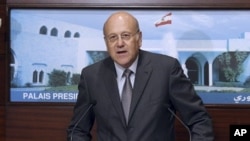After five months of political horse-trading, Lebanon finally has a government, cementing Hezbollah’s political dominance over the tiny Mediterranean country. Analysts say the new government’s fortunes and longevity could be tied to those of neighboring Syria, one of the group’s main patrons, but its political ascendance is unlikely to cause any dramatic geopolitical shifts in the region. The new government’s first key test could be how it responds to possible indictments from the Special Tribunal for Lebanon.
The Shi'ite militant and political movement and its allies control 18 of 30 portfolios in the new cabinet, including key ministries such as Defense, Justice and Telecommunications.
Hezbollah has been a serious player on the Lebanese political scene for years, flexing its military muscle in a war with Israel in 2006 and challenging the pro-Western government during street battles in 2008.
In January, Hezbollah and its allies forced the collapse of Prime Minister Saad Hariri’s government over the issue of the United Nations-backed tribunal which is investigating the death of Mr. Hariri’s father, the former Prime Minister Rafiq Hariri. The elder Hariri and 22 others were killed in a massive truck bombing on the Beirut seafront in 2005. The tribunal is widely expected to issue indictments soon that could include Hezbollah members.
Paul Salem, the director of the Carnegie Endowment’s Middle East Center in Beirut, says the announcement will be a big political event in Lebanon if Hezbollah or Syrian officials, or security personnel are indicted.
“That will be a firestorm in itself, which the country as well as the government would have to deal with," said Salem. "That would be a very explosive and unpredictable set of events.”
Since Hezbollah and its allies toppled the previous government over the issue of the U.N. tribunal, analysts say it is unlikely the new government will authorize the continued payment of Lebanon’s 49 percent share of the court’s cost. They question whether there will be government pressure on the four Lebanese judges on the panel to quit. And there is also the issue of cooperation in handing over any possible indictees who reside in Lebanon.
Hezbollah-backed Prime Minister Najib Mikati has promised that Lebanon will respect its international commitments. However, out-going Justice Minister Ibrahim Najjar, who is part of Saad Hariri’s March 14 coalition, says he would be “very astonished” if the tribunal is included in the new cabinet’s policy statement, which lays out its agenda.
“The Hariri government has resigned or has been forced to resign because of the Tribunal and it would be really something unbelievable that the Tribunal would be a part of the new government’s commitments. I am sure it will not be," said Najjar.
But American University in Beirut political science professor Hillal Khashan argues that it probably will not matter who is in charge when the indictments are announced, because the end result will be the same.
“But there is a difference between announcing the indictments and acting upon them. Everybody knows that the Lebanese state is soft; everybody knows that the Lebanese government is incapable to take on Hezbollah, is incapable of apprehending Hezbollah members who are at-large," said Khashan. "So it does not really matter who is the prime minister: the behavior of Hezbollah vis-à-vis the government will be invariable.”
Carnegie’s Paul Salem says another concern the Iranian- and Syrian-backed Hezbollah has is the outcome of the three-month-old anti-government uprising in Syria, which could change the group’s fortunes.
“This is a pro-Syrian government," he said. "If the regime in Syria survives and continues and regains its footing and influence, then this government will continue on. If within a few months, the government in Syria has been replaced or something dramatic happens, this government will probably be impacted by that.”
Professor Khashan agrees that Hezbollah is worried about Syria and the regional climate in general, which is not moving in its favor as the Arab Spring turns to summer.
“Hezbollah at the moment prefers to be left alone," he said. "They are playing very low key. They are nervous about developments in Syria and they do not want to be conspicuous. It suits Hezbollah at the present juncture in regional and Lebanese affairs to be unnoticed.”
That lower profile bodes well for Lebanon’s southern neighbor Israel, with whom Hezbollah waged a month-long war in 2006. Analysts say that despite their history, neither side wants to engage in another conflict.
Beyond the region, the United States and Europe are watching closely to see what route the new government takes. The United States lists Hezbollah as a terrorist organization and its rise to power could lead the U.S. to reevaluate its military and economic aid to Lebanon, particularly if Beirut cuts its cooperation with the Special Tribunal for Lebanon.
Lebanon Tribunal Likely First Test of New Hezbollah-led Government




